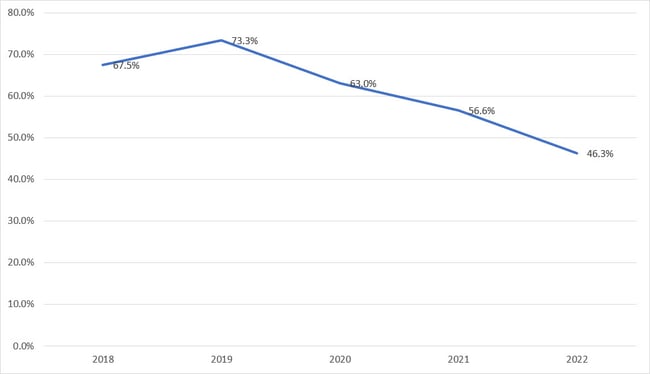When you enroll in college, one of the first things people tell you is that your GPA matters. Indeed, good grades show that you attend classes and are engaged in learning. They also distinguish your efforts and performance from your peers.
But when the time comes to start job hunting, you might be wondering: Should I put my GPA on my resume? This post provides a detailed answer.
Should I Put My GPA on My Resume?
Yes, you can include your GPA on your resume if it’s relatively high. But most employers today no longer rely on GPA as a metric for filtering job applicants. Only 46.3% of employers still filter job applicants by GPA in 2022. Others give more weight to the applicants’ skills and work experience.
The above data comes from this year’s survey by the National Association of Colleges and Employers (NACE). The organization found an ongoing decline in the usage of GPA for screening applicants (especially recent graduates) over the past three years.

Source: NACE
The reason behind this trend is that many employers are looking to hire a more diverse workforce — and give more opportunities to traditionally disadvantaged candidates. These include college drop-outs, people with trade education, as well as college graduates who focused more on part-time work, rather than academic excellence.
Likewise, reliance on GPA often disproportionately affects people of color. According to a recent analysis by WayUp, Black job applicants are currently being rejected 72% more often than White applicants because of one question: GPA.
So it follows that progressive companies are reducing the emphasis on GPA. For instance, Google removed GPA on resumes as a screening criterion back in 2013. In an interview, Google’s then-senior VP of People Operations Laszlo Bock said that:
“Google famously used to ask everyone for a transcript, GPAs, and test scores. But we don’t anymore unless you’re just a few years out of school. We found that they don’t predict anything.”
Likewise, the former CEO of IBM, Ginni Rometty, mentioned that “employees without four-year degrees perform just as well or better than those with a traditional education”. That’s why the company also scrapped many degree requirements for job applicants.
Still, not all industries or employers are ready to bid GPA goodbye. Per NACE data, GPA is still a screening factor for employers in the utility industry, with almost 100% using it. Also, 68% of enterprise-sized organizations (with 10K-20K employees) prefer to use GPA.
When Should You List Your GPA on a Resume?
It’s a good idea to list your GPA on your resume in the following cases:
- The job ad or application form explicitly asks for it.
- You are a recent graduate without much work experience
- You are looking for a job in academia or education
- Your score is 3.2 or higher
Let’s dwell on the last point a bit further.
What is a Good GPA?
A good GPA score is 3.0–4.0. According to NACE, 3.0. is the most common cut-off point among organizations, using GPA as a candidate screening tool. For top colleges, a good GPA score to be admitted to prestigious graduate programs is 3.5-4.0. But employers have a lower entry bar.
Where to Put GPA on Resume?
Your GPA has to be listed in the education section of your resume, right after the name of your college and degree type. As a recent graduate, you may be tempted to put your GPA in the professional resume summary or resume objective to spotlight it as an accomplishment. Don’t do that. Most employers are more interested in learning about your practical skills and experience, rather than college grades. Your GPA isn’t always seen as a strong indicator of performance in the workforce — your skills and knowledge are.
How to Put GPA on Resume: 3 Examples
Your GPA score should sit at the bottom of the page in the education section of your chronological or functional resume.
In both cases, you have three ways to format a GPA entry on your resume.
Example 1
Colorado State University
Bachelor’s of Arts in English Literature
Overall GPA: 3.5
This is the standard formatting approach we use in most resume samples. First, you list your university name, next your degree, then your GPA. You can opt to list either your major GPA or overall GPA.
Example 2
Colorado State University
Bachelor’s of Arts in English Literature
Magna Cum Laude
An alternative way to list a GPA on your resume is to refer to your honors title. This is a good strategy for people, whose universities don’t use a GPA system.
Example 3
Colorado State University
Bachelor’s of Arts in English Literature
Minor in Philosophy
Overall GPA: 3.3
Major GPA: 3.75
Finally, if you really want to elaborate on your credentials, you can mention your major and minor. Then add the GPA scores for both. This is a bit of an overkill if you apply for an entry-level job. But might play to your strengths if you are after an academic position, which is more related to your major.
Final Thoughts
Ultimately, the decision to bring up your GPA on a resume boils down to the type of company you apply to and your overall score. If it’s above 3.0. — you might want to include it. Otherwise, it’s okay to skip this bit in favor of other impressive details like your soft skills, industry certifications, extra training, or even volunteering work.






